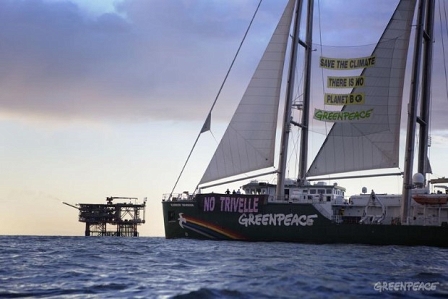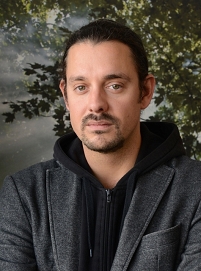Erstellt am: 11. 5. 2016 - 14:20 Uhr
Adapt or Die - a stark warning to oil companies
It's a tough time for oil companies, which have been hit recently by low crude prices, tougher climate protection plans and a divestment movement - which has seen 500 major institutions promising to remove their investments in fossil fuels.
Today, business reporters are annoucing "rough waters ahead" for Austrian oil company OMV.
And an eye catching new report by the Chatham House think tank, called The Death of the Old Business Model, suggests they have been damaged by their own and are now facing a battle for survival.
Here in Austria Greenpeace is appealing to OMV - which has recently recorded profit reductions - to adapt to the times and look to a future where carbon no longer plays a role in energy production.
Keeping the oil in the soil
The maths of climate change is actually relatively simple, say scientists. If we are to fulfil the Paris pledge to keep global warming to less than 2 degrees, or better to beneath a barrier of 1.5 degrees Celsius, and thereby avoid catastrophic climate change, we can only burn at most one third of the known reserves by 2050. And yet Austrian oil company OMV is busy searching for new sources, this time off the coast of Norway.
That’s why Greenpeace’s Adam Pawloff had a message for them:
“Our message to OMV is not to keep looking for new sources of oil but to focus on consolidating their portfolio as it is, in line with two degrees of warning; and on the other hand to look to the future. What role can oil and gas companies play in the future in the energy transition?"
On this point Greenpeace is backed up by Austrian energy expert Georg Günsberg who says it is high time oil companies changed their strategy; and this time not just for the sake of polar bears, or the populations of poor countries threatened by desertification, or islanders in the Pacific watching their homes swallowed by the sea – but for the sake of their own business models and for the sake of their investors:
Brutish End?
“The whole oil and gas sector is in trouble right now. There are a lot of studies released recently, one by Carbon Tracker for example, showing that the business model doesn’t work anymore.”
The most prominent report, from Chatham House, was authored by Paul Stephens, a very well respected visiting professor at University College London. He suggested that oil firms have 10 years to change strategy or face a what he called 'short, brutish end'
We did of course contact OMV, they declined to comment, stating “we are not in a position to comment the decisions of our investors.”
Oil companies have long shrugged off warnings made by environmentalists, or even from scientists, but surely their ears were pricked when a figure from the heart of the establishment, Bank of England governor Mark Carney raised the alarm bell. Late last year, he warned investors face “potentially huge” losses from climate change action that could make vast reserves of oil, coal and gas “literally unburnable”.
Certainly Greenpeace's Pawloff thinks they should heed the warning, and change course or “their business model is coming to an end and they will, eventually, come to an end."
An Addiction
So why are they taking the advice? Dr. Steffen Bukold is an energy market expert from Hamburg. I meet him outside a city café surrounded on three sides by busy carbons spewing traffic. Governments, which are often deeply invested in these companies, are not pushing them to change. They say we need change to change, make distant targets for change, but in the visible future, in the short term, they are doing little to promote a healthy transition.
“There are governments like the Dutch or British which want dividends, which can be enormous, from companies like BP or Shell,” explains Dr Bukold, “and of course we are still very dependent on the flow of oil. There is a sort of dependence.”

© Francesco Alesi / Greenpeace
A Gamble
Looking out at the surrounding roaring traffic, the dependence is all too clear. I start to feel despondent about the chances of success breaking out of this dependence and changing the status quo. This is a country where the government has taken the best part of two decades muddling on how to ask people to simply step outside to take a cigarette and how to enforce that simple request.
Now we have a climate agreement that demands countries worldwide make difficult, well-planned policy choices that go beyond populism, short-term profit and the next election. If oil companies are looking for more oil, it seems they are simply gambling that the global pledge of decarbonisation will simply be ignored:

Georg Mayer
“It’s a kind of speculation of course,” says Georg Günsberg, “the question is does the sector see itself as part of the problem or part of the solution?”
A lose/lose situation?
If the oil companies are wrong in their gamble and don’t adapt in time to strong climate legislation, then Professor Stephens says they are doomed. Shareholders could lose buckets of money, people might lose the value of their pension funds. If the oil companies are right, if the pledges are not fulfilled, then consequences are unthinkable.
“If coal, oil or gas are still playing a significant role in the global economy to 2050 we’re talking of up to six degrees of global warming,” says Adam Pawloff of Greenpeace, “which in Austrian could mean anything between eight or twelve degrees”.


